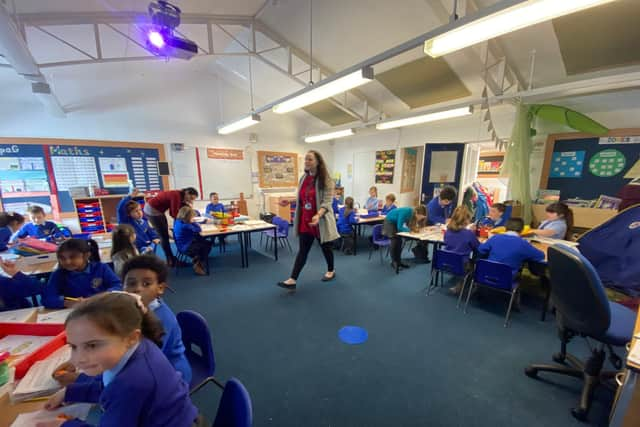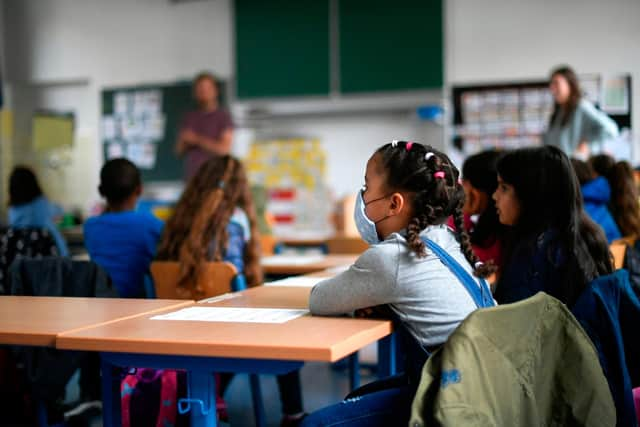Plans to lift isolation measures spark concerns after Covid outbreaks in Sheffield schools
and live on Freeview channel 276
The plans come just as the highly contagious Covid Delta variant continues to quickly spreading through the country, causing outbreaks in Sheffield schools.
But it is not something unexpected, said Director of Public Health in Sheffield Greg Fell, given the transmission rate of the more aggressive Delta variant which was first detected in India and is now the UK's most dominant strain.
Advertisement
Hide AdAdvertisement
Hide AdHe said: "We are seeing a rise in Coronavirus cases across secondary schools which is not unexpected given the transmission rate of the Delta variant, present as it is.


"We are working directly with Public Health England to support schools to manage cases and hold outbreak support meetings with schools where necessary."
He said further measures at individual schools may be put in place if required and they are also working closely with the Department for Education to help guide schools through the next three weeks as the end of term approaches.
"We consistently review our case position with Public Health England and ensure that we are taking all essential steps to slow and contain further transmission."
Advertisement
Hide AdAdvertisement
Hide AdPupil absence in schools due to Covid has hit a new record high in England since children returned to physical learning in March, according to data from the Department for Education.


Around one in 20 (5.1 percent) state school pupils did not attend class for reasons related to Covid on June 24, up from 3.3 percent on June 17 and 1.2 percent on June 10.
The figures also show that around 279,000 children were self-isolating due to a possible contact with a Covid-19 case, a further 24,000 pupils had a suspected case of coronavirus and 15,000 had a confirmed case.
Current rules state that children have to self-isolate for 10 days if another pupil in their bubble tests positive for the virus.
Advertisement
Hide AdAdvertisement
Hide AdA secondary school in Sheffield, Firth Park Academy is the latest one to send the pupils home for remote learning after their Year 8 and Year 10 bubbles had 'burst'.
On Monday, Health Secretary Sajid Javid said he has asked for "fresh advice" on the issue, adding that the policy is "having a huge knock-on impact" on children's education.
The Department of Education also said ministers have written to secondary schools asking them to prepare to potentially replace isolation rules with regular testing - with a final decision to be announced by July 19.
Meanwhile, schools minister Nick Gibb said the Government is carrying out a review into using testing to end self-isolation for school pupils in bubbles.
Advertisement
Hide AdAdvertisement
Hide Ad“We are conducting trials of daily contact testing as a possible alternative to self-isolation,” he told Sky News.
“What matters also is that we keep the school safe and, if you go around our schools, you will see a raft of measures to reduce the infection rates within schools.
“There’s extra hygiene, there’s staggered breaks, we keep children in bubbles, and there’s extra ventilation in classrooms to minimise the risk of transmission.”
Scientists have also backed any change to the rules, with Professor Adam Finn, from the Joint Committee on Vaccination and Immunisation (JCVI), who said: “Children don’t get ill very much when they get this infection so the harm that’s done to them by closing schools or by excluding them from schools far exceeds any harm they get from the virus itself”.
Advertisement
Hide AdAdvertisement
Hide AdHe told LBC radio there needs to be a “balanced response”, adding that “anything that can be done to minimise the disruption to children’s education is a good thing.”
Professor Russell Viner, a member of Scientific Advisory Group for Emergencies (Sage), said schools had played an important role but the system now appears “to be having very significant unintended consequences in terms of loss of education and social isolation, with impacts upon children’s mental health”.
He added: “It is now time to undertake an evidence-based reassessment of our system of controls in schools for September.
“We will then have a nearly fully vaccinated adult population – which undoubtedly changes the balance of risks for the controls which we place on our children and young people in schools.
Advertisement
Hide AdAdvertisement
Hide Ad“Children and young people will be the only substantial unvaccinated segment of the population – and we must be careful that we don’t apply unnecessary controls to their lives in schools when vaccinated adults have more freedom.”
He said he supported lateral flow testing but given that we should have more “spare” PCR test capacity owing to people being vaccinated, more PCR testing could be dedicated to schools “potentially allowing more rapid release of negative contacts from isolation”.
However, Sheffield mum-of four Murni Mokhtar, whose youngest child is in Year 9, has expressed her worries over the possible lifting of isolation measures - as this could still put the children's health at risk.
"So far, my son's school has not detected any Covid case and I'm thankful for that. But if the isolation measure is to be scrapped and replaced with regular testing, then the regular testing needs to be made compulsory rather than voluntarily like we have now," she said.
Advertisement
Hide AdAdvertisement
Hide AdStephen Betts, Learn Sheffield's Chief Executive, also acknowledged that Sheffield's children and young people have lost a great deal of learning time over the past 16 months through lockdowns and periods of isolation.
He added: "The support that Sheffield schools and academies have received from Public Health locally has been outstanding and this continues to be the case.
"In any discussion about making changes to the regulations the key is to ensure that there is clarity and new guidance comes sooner rather than later so that settings can be planned."